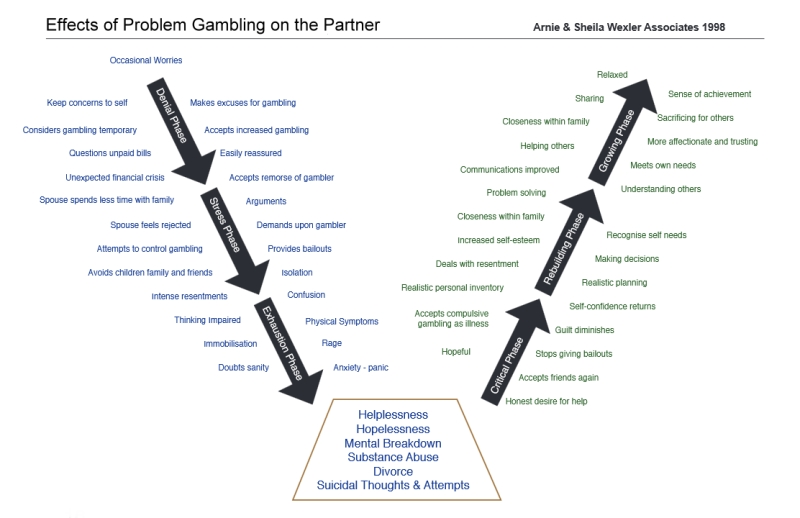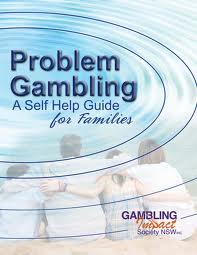Help for the Friends and Family of Gamblers:

The devastation and emotional suffering that gambling can cause spouses, children, parents, siblings and friends is huge. It can range from seeing a loved one self-destruct and being powerless to stop it, to the shock of losing the family home and assets. When you care about a problem gambler it can be hard to know the right things to say or what to do. This article offers some do and don't strategies to help the friends and family of problem gamblers.
When one person is impacted by a health issue, others in the family will be affected. This is no less true with problem gambling. All family members and sometimes extended family and friends can become negatively affected. Compulsive and problem gamblers often need the support of their family and friends to help them in their struggle to stop gambling. But the decision to quit has to be theirs. As much as you may want to, and as hard as it is seeing the effects, you cannot make someone stop gambling
The good news is that with information, education and support, families and friends can be the source of positive change.
How to tell if your loved one has a gambling problem:
Identifying a gambling problem is often difficult. People who gamble problematically may hold deep seated feelings of shame and fear of rejection. These factors combine to create considerable barriers to help-seeking and explain why some people deny the problem until the impacts are severe.
If your friend or family member has a gambling problem, he or she might:
- • have long, unexplained absences from home, school, or work
- • withdraw from family and friends
- • seem anxious or distracted, or have difficulty paying attention
- • have mood swings, usually high when winning and lower when losing
- • get overly upset at the conclusion of sporting matches or online games
- • suddenly become secretive over money and finances or start to hide bank and credit card statements
- • display intense interest in gambling conversations
- • ask friends and family for money
- • have unexplained debts, or windfalls of cash or new items (like new clothes or jewellery)
- • is always either short of money, or exceedingly generous
- • has money conflicts with other people
You may notice that:
- • money is missing from the house or from bank accounts
- • an increasing lack of money despite the same income and expenses
- • your family member takes on extra jobs, but you don't see any extra money
- • unexplained dwindling of savings and assets
- • jewellery or other valuables mysteriously disappearing and reappearing as they are pawned
- • your family member talks about gambling all the time
- • your family member defends gambling as a way to get money
- • Your family member may get secretive, defensive or even blame you for the need to gamble, telling you that it is all for you and you need to trust in the "big win someday."
How to help you and your family when there is a gambling problem:
If your family member has a gambling problem, you will likely experience many conflicting emotions. People do not develop gambling problems over night. Many people are unaware of the signs of problem gambling and it can take some time for the gambler to realise the serious nature of the problem.
Do's and Don'ts for Family of Problem Gamblers:
Do:
- • Seek support; attend counselling or a support group - You have a right to protect yourself emotionally and financially. Let your family member know that you are seeking help for your own sake because of the way gambling affects you and the children. The right support can help you make positive choices for yourself, while encouraging your loved one to get help.
- • Explain problem gambling to the children - Children are usually aware when their parents are going through stress and worries. When a parent or caregiver has a gambling problem, children can feel forgotten, depressed and angry. They may believe they caused the problem. Children may believe they must take sides between their parents. They may stop trusting a parent who makes promises he or she doesn't keep. Some children may try to draw attention away from the parent with the gambling problem by misbehaving. If you are open with your children they will have more of an understanding of what is happening in the family and will be better able to cope.
- • Tell the person how his or her gambling affects you and the family - Partners of gamblers often feel confused, angry and helpless. Don't be afraid to tell them how their gambling affects you, but remain calm (yelling and arguments upset everyone in the family and usually resolve nothing).
- • Let them know that you support them in any efforts to change - Remember that people can and do recover from problem gambling, however behaviour change can be hard for some people. Ask the gambler how they are going with their efforts to reduce or stop their gambling. Ask this in a non-judgmental way, so they don't feel like they will be harshly judged if they answer they are not going so well.
- • Recognize your partner's good qualities - You will likely feel furious, worried upset and betrayed by your loved one's gambling. Your family member may have borrowed (or even stolen) money from you with no way to pay it back. He or she may have sold family possessions or run up huge debts. When faced with the consequences of their actions, a gambler can suffer a crushing drop in self-esteem and may even contemplate suicide. Remember the things you love about your family member. Encourage them to be open and honest with you about their gambling problems, and encourage them to seek professional help.
- • Understand the need for treatment of problem gambling despite the time it may involve - Gambling problems affect a whole range of people, and having a gambling problem is absolutely no reflection on a person's level of intelligence or will power. Gambling problems affect people from all walks of life from bankers to doctors to labourers. Highly intelligent and highly disciplined people can all succumb to gambling problems. Beating yourself or your family member about gambling is NOT an effective strategy helping a person to stop. What's more, will power alone, is rarely enough to help people stop. What helps the vast majority of people stop or reduce their gambling, is to have a guide, a counsellor who can help them uncover the reasons why they gamble in the first place.
- • Take control of family finances; review bank and credit card statements regularly - It may help if you take over the family finances to make sure the gambler stays accountable and to prevent relapse. Set up separate accounts, keep credit cards and cash safe and review your statements often. You might need to consider transferring assets into your own name. Problem gamblers often become very good at asking for money, either directly or indirectly. They may use pleading, manipulation or even threats and blaming to get it. It takes time and practice to learn how you will respond to these requests to ensure you are not enabling the problem gambler and keeping your own dignity intact.
Dont:
- • Preach, lecture, or allow yourself to lose control of your anger.
- • Make threats or issue ultimatums unless you intend to carry them out.
- • Exclude the gambler from family life and activities. .
- • Expect immediate recovery, or that all problems will be resolved when the gambling stops.
- • Bail out or enable the gambler by lending him or her money.
- • Cover-up or deny the existence of the problem to yourself, the family, or others.
People experiencing problem gambling often feel ashamed about their gambling and will conceal the behaviour and associated consequences. Therefore, a non-judgemental and gentle approach that addresses both the gambling and potential harms is required.
Remember, seek help for yourself and your family. Family and friends of problem gamblers often don't think to get help for themselves, but it is very important to ensure YOU receive the support you need. Contact us to make an appointment with your nearest Gamblign Help service.
